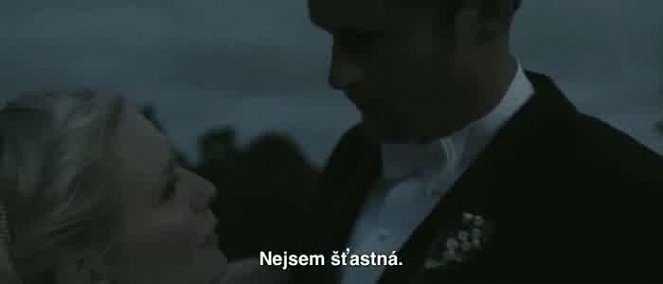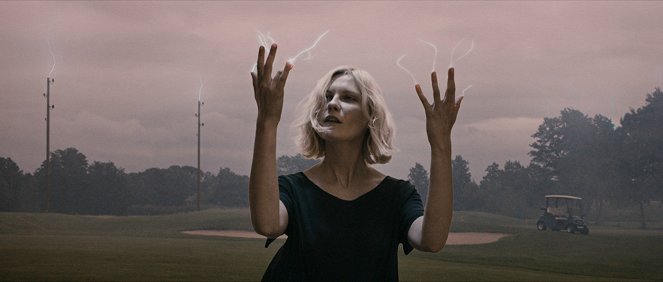Directed by:
Lars von TrierScreenplay:
Lars von TrierCinematography:
Manuel Alberto ClaroCast:
Kirsten Dunst, Charlotte Gainsbourg, Kiefer Sutherland, Charlotte Rampling, Udo Kier, Alexander Skarsgård, Stellan Skarsgård, John Hurt, Jesper Christensen (more)VOD (4)
Plots(1)
Justine (Kirsten Dunst) and Michael (Alexander Skarsgård) are celebrating their marriage at a sumptuous party in the home of her sister (Charlotte Gainsbourg) and brother-in-law (Kiefer Sutherland). Meanwhile, the planet, Melancholia, is heading towards Earth... Melancholia is a psychological disaster movie from director Lars von Trier. (Magnolia Pictures)
(more)Videos (2)
Reviews (9)
The first, not very exciting (worthy of three-stars) half is excellently acted, with a nice variety of international stars in supporting roles. However, it doesn’t bring anything more to the table than any conversation scene from any of Trier’s (or Ozon’s) other films. The second (four-stars), more oppressive, more impressive, visually beautiful half of the film, which is also more interesting in terms of the script, intensifies the experience, resulting in the audience being dazzled by the artistic audiovisuals but perplexed and unfulfilled by the content. It’s as if Trier was just experimenting, trying to materialize a feeling, an idea from a short verse. For some, it may be an interesting and clever meditation (after all, it is an extremely elegant game with pictures, music and characters), but for me Melancholia remains only a handful of positive impressions rapidly fading away after the end credits.
()
This is one destruction of the planet that I actually want to see as a movie. And it’s just as powerful as I had imagined. The human perspective gives the circumstances a certain authenticity and the limited cast in the second half also makes the atmosphere suitably intimate. At the same time, the first “wedding" part comes across like a sarcastic view of various character faults, but maybe it was simply meant to make us feel better, that nobody is perfect and maybe that everybody gets what he/she deserves. Excellent casting, with a weird, but utterly perfectly unstuck Kirsten Dunst and a perfect Kiefer Sutherland who gives a great performance of the only normal (or at least the only character I could identify with) character and spends his time drawing any attention to himself, but as soon as Melancholia comes along, it sweep them all from the surface of the Earth. Amazing escalation. The earth is evil.
()
A pure pleasure. The opening is flawless, the finale fatal. It is excellent for lovers of Richard Wagner and Kirsten Dunst's bust and dimples. The pleasure is multiplied, of course, in the Justine section, which has everything and lacks nothing. Humor is combined with absurdity and symbolism. Why waste the primitive aspects of Udo Kier when we have Alexander Skarsgård's wonderful newlywed games? He hasn't been this close to orgasm since True Blood, and that's saying something.
()
It's not nearly as layered and symbolically connected and confusing as Antichrist. Actually, it's pretty unbalanced. The first part (Justine) is a classic raw probe into the "ceremony", in which, under the pleasing façade of luxury, hides the mud of pathological relationships and the utter emptiness of modern times (the scene in which the heroine frenetically changes the opened reproductions of modernist paintings behind the canvases of Breughel and Caravaggio, the episode with the advertising agency and the ideal slogan). The inspiration for Vinterberg and Lars' roots in Dogma 95 is more than obvious here. The whole thing is drawn to the unforeseen treacherous and dark Kirsten Dunst, who seems to be an earthly reflection of the approaching planet Melancholia - attractive, destructive, unpredictable. The second part, named after Justine's "settled" sister Claire, is a strangely monotonous wait for disaster, with Trier shifting perspective somewhat from the inside of the characters to the sky from which doom approaches. Some of the dialogues, even with hindsight, feel stretched and a little empty, but the overall vibration is powerful, with the ending being the most powerful. The strange static and passivity of the characters is actually exciting when compared to the obsessive "worldly fixers" of American movies. Justine's condemnation hovers over Melancholia like a memento: Life on Earth is evil. There's no point in looking for philosophy and message in that. Trier focused on the characters and the massively gradating wave of feeling that flounders between heaven and earth, laughter and sadness, love and hatred. Melancholia really left me with a deep melancholy. There's no point in asking why. Melancholy doesn't have a clear origin. It's like the planet. It just emerges behind the sun one day and then crashes mercilessly. It doesn't really matter how many rational complaints you can make about von Trier's new film. It is above all a pure and beautiful fetish. If you're from the same blue-green planet as Lars, of course.
()
There aren't many male authors who write out their feelings and then let women play it out. I consider Melancholia one of the most honest authorial statements of recent years and the opening prologue with slow motion shots and Richard Wagner's impressive music an aesthetic orgasm. What the 19th hole meant is, I don't think, very indicative (I can already see Von Trier laughing under his beard as he reads the various nonsensical explanatory theories).
()



Ads